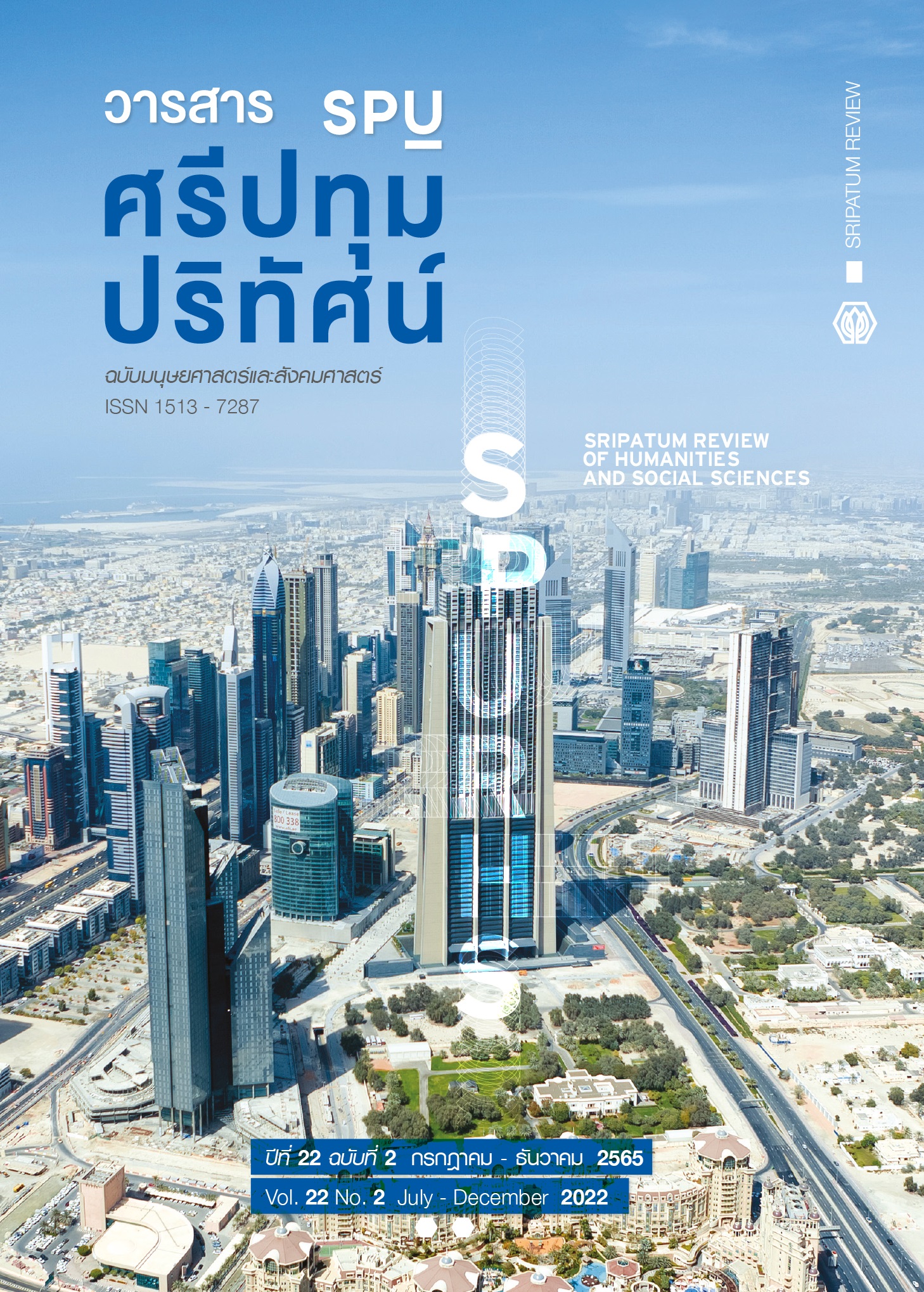Study Behavior and Online Teaching Efficiency in the Era of New Normal
Main Article Content
Abstract
The objectives of this research were (1) to study behavior and classroom communication during online education in the New Normal era of students and (2) to study teaching effectiveness of teachers in the New Normal era. The sample size consisted of 1144 students in Nakhon Phanom University by using the alpha coefficient (∝-Coefficient) according to the method of (Cronbach). The statistics used in the data analysis were percentage, frequency, mean and standard deviation. The results was showed that (1) from the study of online learning behavior of students using a 5-level rating scale, it was found that the overall student online learning behavior was 2.38 (S.D. =.80). From the results of the study, it can be seen that students' online learning behaviors are problematic which affect learning. For this reason, learners should modify their learning behaviors to make learning more effective.
(2) From studying the teaching efficiency of teachers by using a 5-level of rating scale. The overall teaching efficiency of the teachers was averaged 3.54 (S.D. =.83), meaning that the teaching efficiency was moderate. It was found that the students found online teaching makes me cannot concentrated to the study. The mean is 3.32 (S.D. =.92) and the teachers have interesting techniques for teaching online. The mean diversity was 3.39 (S.D. =.83)
Article Details

This work is licensed under a Creative Commons Attribution-NonCommercial-NoDerivatives 4.0 International License.
1. กองบรรณาธิการสงวนสิทธิ์ในการพิจารณาและตัดสินการตีพิมพ์บทความในวารสาร
2. บทความทุกเรื่องจะได้รับการตรวจสอบทางวิชาการโดยผู้ทรงคุณวุฒิ แต่ข้อความและเนื้อหาในบทความที่ตีพิมพ์เป็นความรับผิดชอบของผู้เขียนแต่เพียงผู้เดียว มิใช่ความคิดเห็นและความรับผิดชอบของมหาวิทยาลัยศรีปทุม
3. การคัดลอกอ้างอิงต้องดำเนินการตามการปฏิบัติในหมู่นักวิชาการโดยทั่วไป และสอดคล้องกับกฎหมายที่เกี่ยวข้อง
References
Bozkurt, A., and Sharma, R. C. (2020). Emergency remote teaching in a time of global crisis due to CoronaVirus pandemic. Asian journal of distance education, 15(1), 1-6.
Cela, K., Sicilia, M., and Snche -Alonso, S. (2016). Influence of learning styles on
social structures in online learning environments. British Journal of Educational Technology, 47(6), 1065-1082.
Corlane Barclay, Charlette Donalds and Kweku-Muata Osei-Bryson (2018) Investigating Critical Success Factors in Online Learning Environments in Higher Education Systems in the Caribbean, Information Technology for Development, 24(3), 582-611.
Educational Administration System Database (2021). [Online]. Retrieved March 2021, from: http://reg.npu.ac.th/registrar/home.asp. (in Thai)
Gulatee, Y. (2017). The education is open: Online Education in Thailand. Sarakam: Chaimonkon Printing. (in Thai)
Gulatee, Y. and Combes, B. (2018). Owning ICT: Student Use and Ownership of Technology. Walailak Journal of Science and Technology, 15(1), 81-94.
Gulatee, Y, Pragram, J. and Combes, B. (2018). Which Tech Will I Use? Trends in Students’ Use and Ownership of Technology in a Thai University, an Ongoing Study. Journal of ICT Research Application, 12(2), 138-153.
Gulatee, Y. (2010). An investigation into Online Teaching and the Delivery of Computer Science Topics: Practice, Content and Environmental Factors. Thesis of the Degree of Doctor of Information Technology, Perth, Australia: Edith Cowan University.
Mathuros, S. (2021). Management Education Online in the New Normal. Rajapak Journal, 15(40), 33-42. (in Thai)
Lastariwati, B., Komariah, K. Mulyatiningsih, E. and Kartika, M., G. (2021). Exploration of the Determining Factors of Successful Online Learning in the Industrial Revolution 4 Era .Journal of Physics: Conference Series, 1833, 1-6.
Pender, N. J. (1982). Health Promotion in Nursing Practice. [Online]. Retrieved June 28, 2018, from: https://www.nature.com/articles/s41746-020-0244-4
Srisa-ard, B. (2010). Discrimination. [Online]. Retrieved 10 January 2010, from: http://www.kroobannok.com/news_file/ p53184971026.pdf. (in Thai)
Swan, K., Shea, P., Fredericksen, E., Pickett, A., Pelz, W. and Maher, G. (2000). Building Knowledge Building Communities: Consistency, Contact and Communication in the Virtual Classroom. Journal of Educational Computing Research, 23(4), 359.
Yudiawan, A., Sunarso, B., Suharmoko, S., and Fatma, A. (2021). Successful Online Learning Factors in COVID-19 Era: Study of Islamic Higher Education in West Papua, Indonesia. International Journal of Evaluation and Research in Education, 10(1), 193-201.
Yotongyod, M. and Sawudeesun, P. (2008). The Number of the Sample for the Research. [Online]. Retrieved October 28, 2014, from: http://research.bu.ac.th/knowledge /46/Samplesize.pdf. (in Thai)


